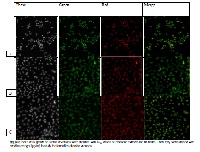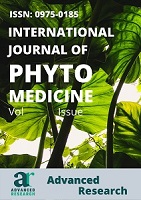A Study on the Ethanolic Extracts of Red Seaweed- Gracilaria corticata (J.Agardh) J. Agardh, to Assess the Antiproliferative Activity and Morphological Characterization of Apoptosis on HeLa Cell lines
Keywords:
HeLa, MTT, Acridine orange, Hoechst 33342, Gracilaria corticataAbstract
Marine algae are excellent source of bioactive compounds that can be used as an alternative source for finding novel anti-cancer molecules. Gracilaria corticata, red algae from Surathkal beach, Karnataka were studied for their anti-proliferative activities and their morphological characterization on HeLa cells were assessed. Cytotoxicity of the algal ethanolic extracts on HeLa cells were assayed by 3-(4,5-dimethylthiazol-2-yl)-2, 5- diphenyltetrazolium bromide (MTT) reduction method. Morphological assessment was done by examinations with Hoechst staining and acid vacuoles were determined using acridine orange. Induction of apoptosis was studied using caspase activity. Based on IC50value, further morphological assessment was carried out and apoptosis was confirmed using Hoechst 33342 staining and acridine orange staining respectively. Treated cells became round with blebbings with condensed nuclei. Acidic lysosomal vacuoles formation occurred in treated cells. These red algae were able to suppress proliferation and promote apoptosis-- mediated cell death with induction of initial stages of apoptosis in HeLa cell lines. Thus, this seaweed can be a potent candidate for isolating new green drug anticancer molecules. However, further characterization at the molecular and structural levels are required.
References
Costa LS, Telles CB, Oliveira RML, Nobre T, Dantas-Santos N, Camara RB, et al. Heterofucan from Sargassum filipendula induces apoptosis in HeLa cells. Mar. Drugs 2011, 9, 603–614.
Yamamotoi I, Takahashi M, Tamura E, Maruyama H, MoriI H. Antitumor activity of edible marine algae: Effect of crude fucoidan fractions prepared from edible brown seaweeds against L-1210 leukemia. Hydrobiologia; 1984; 116-117.
Glaser, K.B. and Mayer, A.M. A Renaissance in Marine Pharmacology: From Preclinical Curiosity to Clinical Reality. Biochemical Pharmacology 2009; 78: 440-448.
Faulkner DJ. Marine natural products. Nat Prod Rep 2000; 17: 7-55.
Tzivelekala, Vagias C, Roussis V. Natural products with anti-HIV activity from marine organisms. Curr Top Med Chem 2003; 3: 1512-1535.
Park, E.J. and Pezzuto, J.M. Antioxidant Marine Products in Cancer Chemoprevention. Antioxid Redox Signal 2013;19, 115-138.
Zhang Z, Teruya K, Yoshida T, Eto H. and Shirahata S. Fucoidan Extract Enhances the Anti-Cancer Activity of Chemotherapeutic Agents in MDA-MB-231 and MCF-7 Breast Cancer Cells. Marine Drugs 2013; 11: 81-98.
Kim AD, Lee Y, Kang SH, Kim GY, Kim HS and Hyun JW. Cytotoxic Effect of Clerosterol Isolated from Codium Fragile on A2058 Human Melanoma Cells. Marine Drugs, 2013; 11: 418-430.
Synytsya A, Kim WJ, Kim SM, Pohl R, Synytsya A, Kvasnicka F, et al. Structure and antitumor activity of fucoidan isolated from sporophyll of Korean brown seaweed Undaria pinnatifida. Carbohyd Polym 2010; 81: 41-48.
Gerwick WH, Bernart MW. Eicosanoids and related compounds from marine algae In: Zaborski OR, Attaway DH (org) Marine Biotechnology. New York: Plenum Press, p 1993; 101-152.
Gamal-Eldeen AM, Ahmed FE, Abo-Zeid MA. In vitro cancer chemo-preventive properties of polysaccharide extract from the brown alga, Sargassum latifolium. Food Chem Toxicol 2009; 47: 1378-1384.
Theisen C. Chemoprevention: what’s in a name? J Natl Cancer Inst 2001; 93: 743-774.
Kim SK, Wijesekara I. Development and biological activities of marine-derived bioactive peptides: A review. J. Funct. Foods, 2010; 2: 1–9.
Funahashi H, Imai T, Mase T, Sekiya M, Yokoi K, Hayashi H, et al. Seaweed prevents breast cancer? Jpn. J. Cancer Res. 2001; 92: 483–487.
Higashi-Okai K, Otani S, Okai Y. Potent suppressive effect of a Japanese edible seaweed, Enteromorpha prolifera (Sujiao-nori) on initiation and promotion phases of chemically induced mouse skin tumorigenesis. Cancer Lett 1999; 140: 21–25.
Lee EJ, Sung MK. Chemoprevention of azoxymethane induced rat colon carcinogenesis by sea tangle, a fiber-rich seaweed. Plant Foods Hum. Nutr.2003; 58: 1–8.
Carper J. Seaweed or kelp. In The Food Pharmacy; Bantam Book: New York, NY, USA, 1989; pp. 264–268.
Bae SJ, Choi YH. Methanol extract of the seaweed Gloiopeltis furcata induces G2/M arrest and inhibits cyclooxygenase-2 activity in human hepatocarcinoma HepG2 cells. Phytother. Res., 2007; 21: 52–57.
Plumb JA. Cell sensitivity assays: the MTT assay. Methods Mol Med.2004; 88:165-169.
Kerr JF, Wyllie AH and Currie AR. Apoptosis: A Basic Biological Phenomenon with Wide-Ranging Implications in Tissue Kinetics. British Journal of Cancer 1972; 26: 239-257.
Konig GM, Wright AD. Marine natural products research: Current directions and future potential. Planta Med 1995; 62: 193-211.
Asadi H, Orangi M, Shanehbandi D, Babaloo Z, Delazar A, Mohammadnejad L, et al. Methanolic fractions of ornithogalum cuspidatum induce apoptosis in pc-3 prostate cancer cell line and wehi-164 fibrosarcoma cancer cell line. Adv Pharm Bull 2014; 4(Suppl. 1): 455-458.
Aghbali A, Moradi Abbasabadi F, Delazar A, Vosough Hosseini S, Zare Shahneh F, Baradaran B, et al. Induction of apoptosis and cytotoxic activities of Iranian orthodox black tea extract (bte) using in vitro models. Adv Pharm Bull 2004;4(3): 255-260.
Doonan F, Cotter TG. Morphological assessment of apoptosis. Methods: 2008; 44: 200–204.
Albano RM, Pavao MSG, Mourao PAS, Mulloy B. Structural studies of a sulfated L-galactan from Styela plicata (Tunicate): Analysis of the Smith-degraded polysaccharide. Carbohydrate Research 1990; 208: 163-174.
Berlinck RGS, Ogawa CA, Almeida AMP, Sanchez MAA, Malpezzi ELA, Costa LV, et al. Chemical and pharmacological characterization of halitoxin from Amphimedon viridis (Porifera) from the southeastern Brazilian coast. Comparative Biochemistry and Physiology Part C: Pharmacology, Toxicology and Endocrinology 1996; 115: 155-163.
Yeh CC, Yang JI, Lee JC, Tseng CN, Chan YC, Hseu YC, et al. Anti-Proliferative Effect of Methanolic Extract of Gracilaria tenuistipitata on Oral Cancer Cells Involves Apoptosis, DNA Damage, and Oxidative Stress. BMC Complementary and Alternative Medicine 2012; 12: 142.
Misurcova L, Skrovankova S, Samek D, Ambrozova J and Machu L. Health benefits of algal polysaccharides in human nutrition. Adv in Food and Nutr Res 2010; 66:75-145.
Ale M T, Maruyama H, Tamauchi H, Mikkelsen JD, Meyer AS. Fucose-containing sulfated polysaccharides from brown seaweeds inhibit proliferation of melanoma cells and induce apoptosis by activation of caspase-3 in vitro. Marine Drugs, 2011; 9(12): 2605–2621.
Zandi K, Tajbakhsh S, Nabipour I, Rastian Z, Yousefi F, Sharafiah S, et al. In vitro antitumor activity of Gracilaria corticata (a red alga) against Jurkat and molt-4 human cancer cell lines. African Journal of Biotechnology 2010; 9: 6787-6790.



